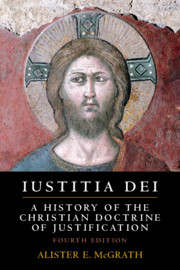Book contents
- Iustitia Dei
- Iustitia Dei
- Copyright page
- Contents
- Tables
- Preface to the Fourth Edition
- Abbreviations
- Introduction
- Part I Justification
- Part II The Middle Ages
- Part III Protestantism
- Part IV Catholicism
- Part V The Modern Period
- Conclusion
- A Brief Glossary of Medieval Soteriological Terms
- Works Consulted
- Index
Conclusion
Reflections on a Study of Doctrinal History
Published online by Cambridge University Press: 27 January 2020
- Iustitia Dei
- Iustitia Dei
- Copyright page
- Contents
- Tables
- Preface to the Fourth Edition
- Abbreviations
- Introduction
- Part I Justification
- Part II The Middle Ages
- Part III Protestantism
- Part IV Catholicism
- Part V The Modern Period
- Conclusion
- A Brief Glossary of Medieval Soteriological Terms
- Works Consulted
- Index
Summary
The research underlying this work began in the closing weeks of June 1978 in the Bodleian Library, Oxford, and ended in March 2019. The original edition of this work emerged from an intensive engagement with primary theological sources and the associated literature, which led to the publication of three interconnected works of historical theology – Luther’s Theology of the Cross (1985), Iustitia Dei (1986) and The Intellectual Origins of the European Reformation (1987). While some were kind enough to refer to the original edition of Iustitia Dei as a ‘definitive’ account of the development of Christian thinking on justification, this was clearly incorrect. No work of historical theology can ever be considered to be ‘definitive’, in that it cannot escape its historical embeddedness, trapped in the controlling assumptions, cultural concerns and scholarly resources of a specific historical location. The first edition of Iustitia Dei reflected the assumptions and resources of the late 1970s and early 1980s; the fourth reflects those of the 2010s which, though more recent, are likely to prove equally transient.
- Type
- Chapter
- Information
- Iustitia DeiA History of the Christian Doctrine of Justification, pp. 414 - 416Publisher: Cambridge University PressPrint publication year: 2020

